#women'shistory
Text
March 2023 Cause of the Month: Women’s History
During the month of March, Women's History Month quotes were shared, along with a resource to learn more; The National Women’s History Alliance, "which spearheaded the movement for March being declared National Women’s History Month... is a leader in promoting Women’s History and is committed to the goals of education, empowerment, equality, and inclusion." Join the movement!
Below are the links to the Instagram posts.
Wednesday, March 1, 2023
Quote 1
Quote 2
Quote 3
Wednesday, March 8, 2023
Quote 4
Quote 5
Quote 6
Friday, March 17, 2023
Quote 7
Quote 8
Quote 9
Friday, March 24, 2023
Quote 10
Quote 11
Quote 12
Thursday, March 30, 2023
Quote 13
Quote 14
Quote 15
—
Below are the links to the Tumblr posts.
Wednesday, March 1, 2023
Quote 1
Quote 2
Quote 3
Wednesday, March 8, 2023
Quote 4
Quote 5
Quote 6
Friday, March 17, 2023
Quote 7
Quote 8
Quote 9
Friday, March 24, 2023
Quote 10
Quote 11
Quote 12
Thursday, March 30, 2023
Quote 13
Quote 14
Quote 15
~~~~~~~~~~~~~~~~~~~~~~~~~~~~~~~~~~~~
MonriaTitans started The Weekend Game Show (WGS) with the mission to educate on and discuss different aspects of game development, and to show why video games can take years to make, with the goal of preventing another Cyberpunk 2077 scenario.
Watch MonriaTitans on Twitch and YouTube!
Please consider supporting by buying MonriaTitans & WGS a Ko-fi!
In addition, what began as a fun activity has become a mission; Artist Shout-Outs are provided with the goal of supporting human artists to combat AI compilations and their parasitic developers. To be clear, she does not have an issue with the AI themselves, only with how they are being constructed.
Want to learn more about the Artist Shout-Outs? Click here!
The Artists Shout-Out posts can be seen on Instagram, Tumblr, Discord, and more!
#women's history#women'shistory#women's history month#women'shistorymonth#women's history month 2023#women'shistorymonth2023#The National Women’s History Alliance#NWHA#educational#educationalpost#educational post#women's history awareness#women'shistoryawareness#women's history quotes#women'shistoryquotes#learnsomethingneweveryday#learn something new every day#becomesmartereveryday#become smarter every day#becomempowered#bempowering#monriatitans#WGS#The Weekend Game Show#theweekendgameshow
0 notes
Photo

Supreme Court Justice Ruth Bader Ginsburg (Photo courtesy of the Supreme Court of the United States).
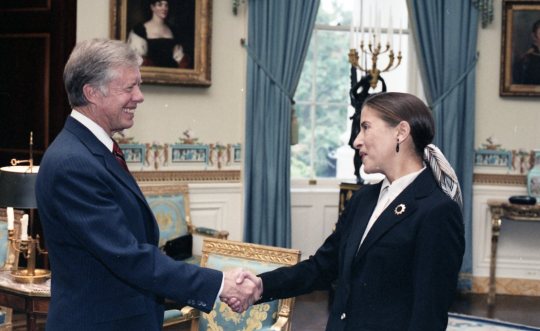
RBG with President Carter at a reception for Women Federal Judges, 10/3/1980, National Archives ID 136050236.
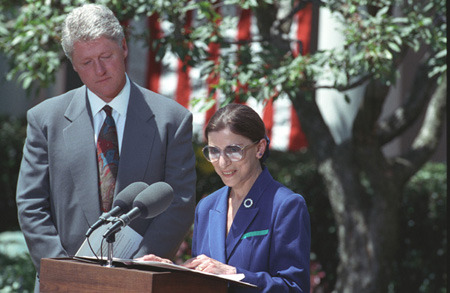
President Clinton with RBG at the Rose Garden press conference to announce that he would nominate her to the Supreme Court, 6/14/1993, National Archives ID 2521376.

President Clinton watches as an elated RBG is sworn in as Associate Supreme Court Justice by Chief Justice William H. Rehnquist, 8/10/1993, National Archives ID 3144719.
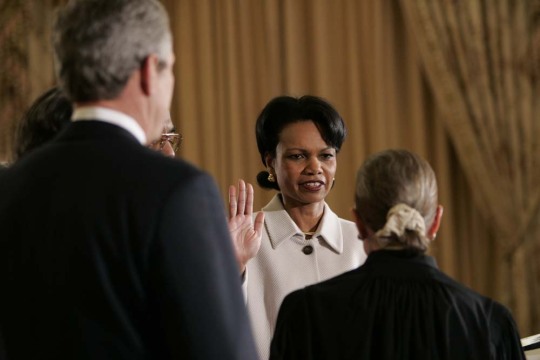
RBG swears in Dr. Condoleezza Rice as Secretary of State, 1/28/2005, National Archives ID 171487271.
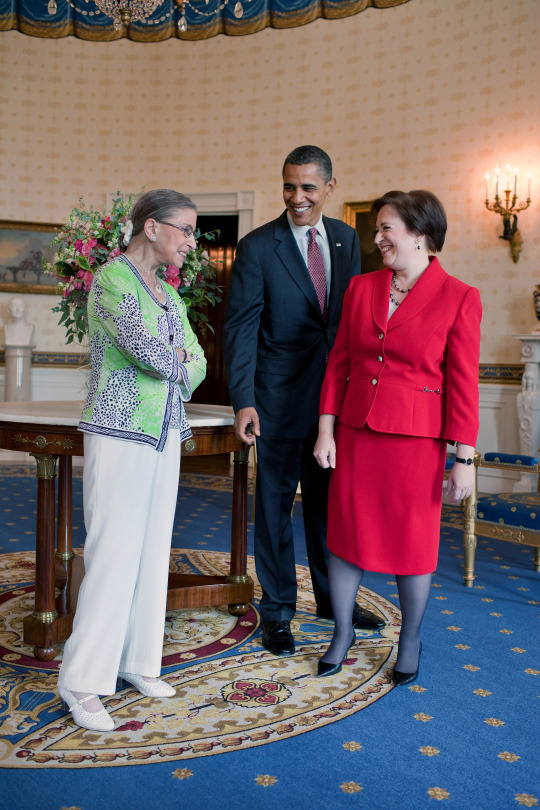
RBG with President Obama and newly confirmed Supreme Court Justice Elena Kagan at the White House, 8/6/2010. National Archives 176550992.

Letter from Rutgers Law Professor RBG in support of the Equal Rights Amendment, 4/15/1971, National Archives ID 26283960.
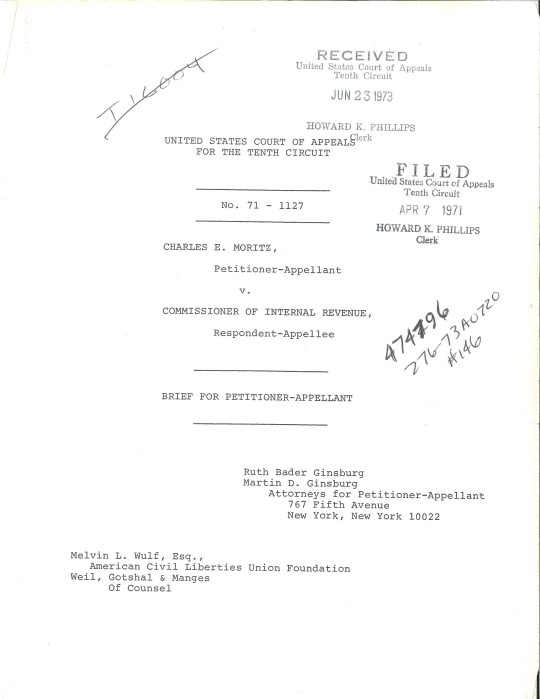
Did you see the movie On the Basis of Sex? Here’s the appeal brief RBG and her husband Marty, aided by Mel Wulf of the ACLU, filed on behalf of Charles Morwitz. See the full brief, National Archives ID 120148054.

RBG addresses 31 newly naturalized citizens at the National Archives on Bill of Rights Day, 12/14/2018, National Archives photo by Kitty Kouwenhoven.
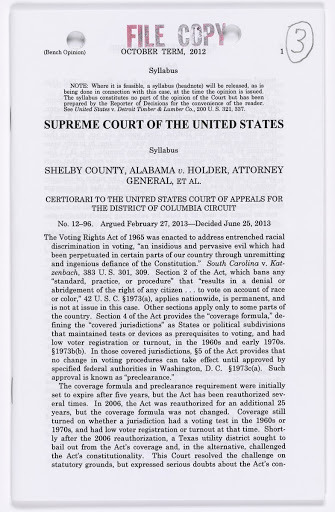
RBG’s dissenting opinion in Shelby County v. Holder, part of the National Archives exhibit "Rightfully Hers: American Women and the Vote."

List of Supreme Court Cases Briefed or Argued by RBG in the 1970s, plus fact sheet, from the Clinton Presidential Library, National Archives ID 131064869.
RIP RBG
“Fight for the things you care about, but do it in a way that will lead others to join you.”
See also:
Supreme Court Justice Ruth Bader Ginsburg Welcomes New American Citizens, National Archives News.
Archivist David S. Ferriero’s welcoming remarks to RBG, petitioners and guests at Naturalization Ceremony on 12/14/2018.
Notorious RBG at the National Archives, Pieces of History blog. Just 16 days after being sworn in as Supreme Court Justice, RBG visited the National Archives to view the original 19th Amendment. 8/26/1993. C-SPAN footage here.
DocsTeach: Letter from Ruth Bader Ginsburg Supporting the Equal Rights Amendment, 4/15/1971.
#rbg#rbgmovie#ruth bader ginsburg#notorious rbg#on the basis of sex#girlpower#strong women#judge#womens rights#equality#women#feminism#scotus#supreme court#ruthbader#women'shistory#court#supreme#womensupportingwomen#brave#we remember#superhero
605 notes
·
View notes
Photo

New display coming up to celebrate Women’s History Month!
1 note
·
View note
Photo
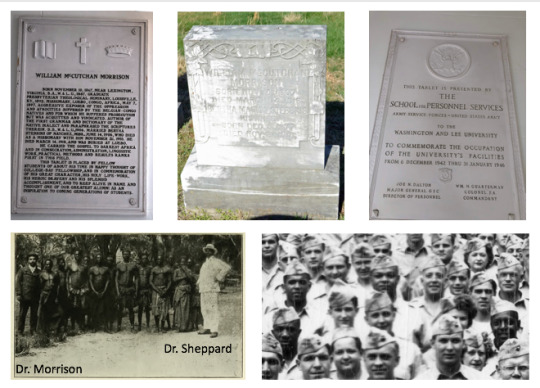
Plaques in Lee Chapel (cont’d): In the first two blog posts, I discussed a selection of the memorial plaques that hang in Lee Chapel. Over two dozen people are memorialized on these commemorative markers. Only two reference the contributions of women or African Americans. Only one woman is addressed by name: Bertha Stebbins of Natchez, Mississippi. In 1906, she married W&L graduate William McCutchan Morrison, class of 1887. For the next four years she served alongside her husband as a missionary in Luebo, a town within the Democratic Republic of the Congo. Mr. Morrison and a fellow Virginian Presbyterian, William Henry Sheppard, brought the mistreatment of native peoples by King Leopold II of Belgium to the attention of the international community. Mr. Morrison also worked on a dictionary of the local language, Baluba; in honor of his contributions the Bakuba tribes nicknamed Mr. Morrison “Kuonyi Nshila (“don’t let the path get closed again”), while Mrs. Stebbins-Morrison was given a name that translated as “perfume of the alabaster box.” She learned Baluba and worked as a school teacher and an amateur nurse. They were buried in Luebo, but a gravestone memorializes them in the New Monmouth Presbyterian Cemetery, here in Rockbridge Co. (Credits: Rev. T.C. Vinson’s 1921 book, William McCutchan Morrison: Twenty Years in Central Africa,“ George Frank ‘19 Africana Studies capstone paper, Maggie Davis, Family Search gravestone photograph).
A second plaque in the chapel commemorates “the occupation of the University’s facilities from 6 December 1942 thru 31 January 1946” by the U.S. Army’s School for Personnel Services. For over three years, W&L rented its campus facilities to the Army’s School for Special Service Officers. This group of scholars included African American soldiers; each of the several hundred soldiers were selected based on their leadership skills. Tucker Hall (then the site of the Law School), the University dining hall (then in Evans), and dormitories (then Graham-Lees; W&L students were sent into the fraternity houses and the town of Lexington), along with four classrooms and the basement of the Student Union were rented to the Army. The soldiers used the gym in the afternoons and always had access to one of the three athletic fields. Female recruits as well as African American officers graduated from the Army’s program. The photo in the post shows a close-up of the 1945 graduation class, standing in front of the Colonnade. (Credits: Special Collections photographs, Ring Tum Phi 1942.11.19, research by Johana Castillo ‘21, Scott Dittman).
1 note
·
View note
Audio
As we continue to honor Women's History Month, we feature an interview from our oral history collection. In this 38-second clip, Gerda Lerner describes the need, in the second half of the twentieth century, to change the history profession. Early in her career, Lerner set out to do just that: she was one of the founders of the academic field of women's history. At the University of Wisconsin-Madison, she launched the first Ph.D. program in women's history.
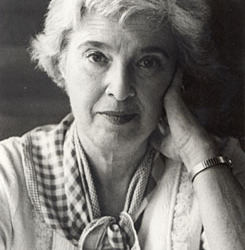
Gerda Lerner was an Austrian-born American historian and author. In 1980, she moved to Madison and was appointed Robinson Edwards Professor of History at the University of Wisconsin-Madison, where she taught until retiring in 1991. During her career, she wrote several books, including The Creation of Patriarchy (1986), The Creation of Feminist Consciousness (1993), and Why History Matters (1997). Ms. Lerner left a lasting impact on the field of history and the University of Wisconsin-Madison.
Lerner passed away in Madison in 2013 at the age of 92. To read the essential information from this oral history, here’s its catalog record. To hear more about Lerner's experience before and at UW-Madison, contact the Archives to listen to the full interview.
Emma Strenski, George L. Mosse Digital Archival Intern
**********
Image is from UW-Madison Archives, S05705
For more information about UW campus history, contact [email protected] or visit library.wisc.edu/archives. On, Wisconsin!
5 notes
·
View notes
Photo
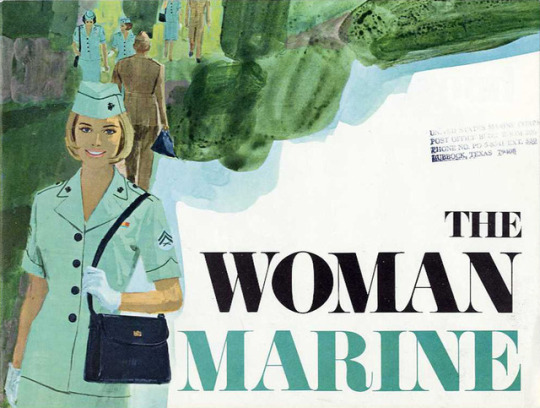
It’s time for the SWC 2017 Highlights, featuring our most popular images of the last year!
March was Women’s History Month, so with that in mind we shared the story of USMC Colonel Margaret Henderson, whose papers we house.
The Marine Corps Women’s Reserve was established in 1943, after years of service by women as USMC Headquarters personnel during World War II. Margaret Henderson was one such Marine, having served throughout the war from 1942 to 1946. After a brief stint teaching at Texas Technological College (now Texas Tech University), she returned to the Marines in 1948 and in 1959 was named the Director of Women Marines, a post she held until her retirement in 1964. This “Women Marines” songbook was among Col. Henderson’s papers.
For more of these and other materials chronicling her career, double-time it over here.
2 notes
·
View notes
Text
Intersectional equity
For week two, the textbook readings centered around the colonial world, 1607-1750. These select readings discussed the diversity of early colonial women. One part discussed African women and how they were crucial to the shift of slavery becoming institutionalized. Specifically a 1643 Virginia law placed a tax on the labor of African women which put them in the same category as European and African male labor. While white women were not included in this tax because of the societal perception that they were needed to do domestic work. As the textbook states, “Privileged white women’s attention to hospitality and fashion, as well as to domesticity and maternal duties, eventually became essential elements in the ideal of the genteel lady that reinforced southern patriarchal culture” (53). This law then influenced the distinction between African women and European women.
This reminded me a lot of the current gender inequities and how it matters to view these issues in an intersectional perspective of gender,race,class and sexuality. For example, the gender wage gap still persists after the Equal Pay Act of 1963 and Title VII of the Civil Rights Act of 1964 both stating discrimination to be illegal. A 2016 report by the Institutes for Women’s Policy Research shows that women’s overall median earnings are lower than men’s in all the 20 most common occupations for women. When broken down by race and ethnicity it revealed that, “Hispanic women have the lowest median earnings at $586 per week (57.2 percent of the median weekly earning of non-Hispanic White men). Black women have median weekly earnings of $641 or 62.5 percent of the median weekly earnings of White men” (“The Gender Wage Gap by Occupation 2016; and by Race and Ethnicity.” Institute for Women’s Policy Research). This is key to understanding the unique challenges women of color endure when discussing the wage gap and seeking solutions.
In comparison to the legal tax acts of 1643 which I would even push to say caused a foreshadowing of ways that legislation and culture defines the distinct experiences of Women of color and White women. The tax which institutionalized slavery also brought negative perceptions of African women but as well pushed White women into subordinate domestic roles. In some modern day gender wage gap discussions, sometimes what is missed is the fact that unique experiences of race,gender and class play a significant role in addressing the issue. It does matter to state that latina and black women are paid significantly less in comparison to other racial groups. This then allows a discussion towards solutions to systems of oppression which historically have affected the most marginalized in our society.
source: https://iwpr.org/publications/gender-wage-gap-occupation-2016-race-ethnicity/
#HistoryofWomeninAmerica history women women'shistory gender publichistory history#History of Women in America
4 notes
·
View notes
Link
Four women from Colorado’s past and the impact they made on the lives of those around them.
0 notes
Video
youtube
When Women Marched on Washington
March is Women’s History Month (WoOHoOo!) - Take the time to appreciate women and a world that certainly would not be the same without women.
Having a very strong, intelligent, & beautiful mother to look up to my whole life had helped shape my understanding of how real women are in real life: one of God’s most precious blessings. Having an older sister to look up to in my baby years (and help keep me in line hahaha) helped me behave, respect, and think about how to treat a lady (and totally taught me about the latest styles, trends, counter-culture, bands, music, fashion, etc). Having a wife helps me be a better man than I could have ever been on my own, and I’ve learned to listen, share, and pray for good days.
I pray that one day I can have daughters (and sons of course) of whom I may be able to care for & love & cherish & support.
Here’s to ALL WOMEN. I applaud you.
#WOMEN#Women'sHistoryMonth#Women'sHistory#History#Females#Girls#Ladies#HistoryWomensMarchOnWashington#WomenMarch#March#AWESOME
0 notes
Text
ANNOUNCEMENT - 02/28/2023

View on Twitter
With February, and Black History Month, coming to an end, a new cause to raise awareness of is in order. If you missed the quotes for February's cause of the month, you can see them here!
March is Women's History Month, so, for March 2023 (and every March, to be frank), I will be sharing quotes pertaining to women's history.
"When feminist rhetoric is rooted in biases like racism, ableism, transmisogyny, anti-Semitism, and Islamophobia, it automatically works against marginalized women and against any concept of solidarity. It's not enough to know that other women with different experiences exist; you must also understand that they have their own feminism formed by that experience. Whether it's an argument that women who wear the hijab must be 'saved' from it, or reproductive-justice arguments that paint having a disabled baby as the worst possible outcome, the reality is that feminism can be marginalizing. If a liberation movement's own representatives are engaging with each other oppressively, then what progress can the movement make without fixing that internal problem?"
- Mikki Kendall, Hood Feminism: Notes from the Women That a Movement Forgot
These are all the updates I had for this evening.
Thank you for reading! May every decision you make in the future be in the spirit of fairness and may the rest of your day NOT go to $#!7.
~~~~~~~~~~~~~~~~~~~~~~~~~~~~~~~~~~~~
MonriaTitans started The Weekend Game Show (WGS) with the mission to educate on and discuss different aspects of game development, and to show why video games can take years to make, with the goal of preventing another Cyberpunk 2077 scenario.
Watch MonriaTitans on Twitch and YouTube!
Please consider supporting by buying MonriaTitans & WGS a Ko-fi!
In addition, what began as a fun activity has become a mission; Artist Shout-Outs are provided with the goal of supporting human artists to combat AI compilations and their parasitic developers. To be clear, she does not have an issue with the AI themselves, only with how they are being constructed.
If you wish to learn more about the Artist Shout-Outs, click here.
You can see the Artists Shout-Out posts on Instagram, Tumblr, Discord, and more!
#announcement#women's history#women'shistory#women's history month#women'shistorymonth#women's history month 2023#women'shistorymonth2023#Mikki Kendall#mikkikendall#Mikki Kendall quote#mikkikendallquote#racism#feminism#feministrhetoric#feminist rhetoric#ableism#transmisogyny#anti-Semitism#Islamophobia#white feminism#whitefeminism#National Women's History Alliance#NWHA#learnsomethingneweveryday#becomesmartereveryday#becomempowered#bempowering#monriatitans#affiliatelink#bookshoporg
0 notes
Photo
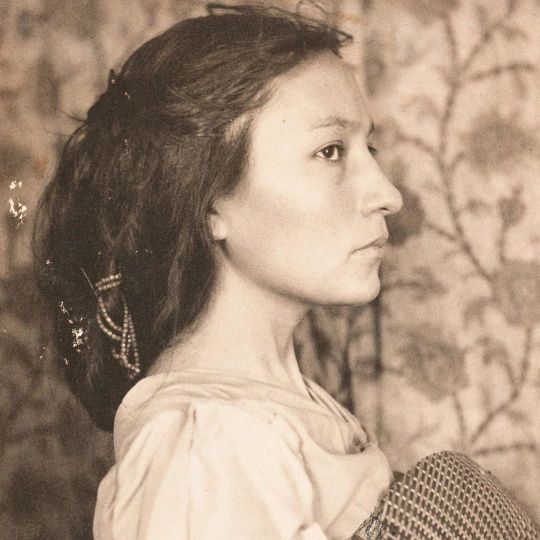
Zitkála-Šá, (Lakota: Red Bird) (1876–1938), was born on the Yankton Reservation in South Dakota. She wrote about her childhood and boarding school experience, and the struggles to retain tribal identities and resist assimilation into European American culture, with essays published in Harper’s and The Atlantic Monthly. She was trained as a violinist at the New England Conservatory of Music, and she co-composed and wrote the libretto for what is considered the first American Indigenous opera, The Sun Dance Opera, in 1913. Zitkála-Šá became a strong advocate for Indigenous rights, lobbying for U.S. citizenship, voting, and sovereignty rights for Indigenous peoples and women. She was appointed the secretary of the Society of American Indians, the first national rights organization run by and for Indigenous Americans, and edited its magazine. In 1926, she co-founded the National Council of American Indians to lobby for increased political power for Indigenous Americans, and the preservation of American Indigenous heritage and traditions. #heroines #women'shistory #womenwhorock #sundance #opera #violin #womenwhowrite #Indigenous https://www.instagram.com/p/CEiL4XfnNZS/?igshid=1v0k811a3gb47
1 note
·
View note
Photo

Get 10% off when you spend $20+ in my shop all Women’s History Month! (via Tell Our Stories from Art By Kali)
0 notes
Text
https://searchmyancestry.blogspot.co.uk/2018/05/new-replica-suffrage-brooch-stunning.html
0 notes
Video
youtube
#LaDestroyer #women'shistory #AskaMortician #deathling #women #feminist
0 notes